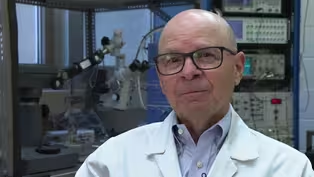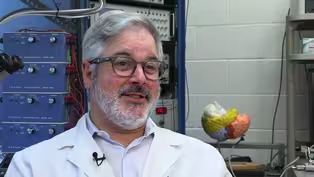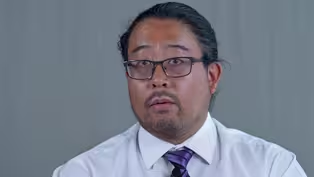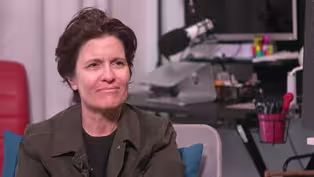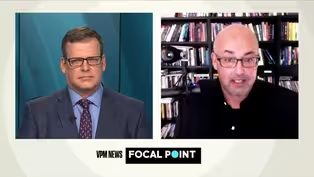VPM News Focal Point
Brain Breakthroughs
Clip: Season 2 Episode 17 | 2m 12sVideo has Closed Captions
Artificial intelligence is proving useful for medical breakthroughs
Deep brain stimulation allows health professionals to bypass the body’s limitations. Seizures decrease, senses return and the ability to walk restored as doctors use technology. Medical professionals believe that programmed computers will increasingly be replaced by smart computers that learn how to help patients more precisely. Artificial intelligence is already assisting specialists nationwide.
Problems playing video? | Closed Captioning Feedback
Problems playing video? | Closed Captioning Feedback
VPM News Focal Point is a local public television program presented by VPM
The Estate of Mrs. Ann Lee Saunders Brown
VPM News Focal Point
Brain Breakthroughs
Clip: Season 2 Episode 17 | 2m 12sVideo has Closed Captions
Deep brain stimulation allows health professionals to bypass the body’s limitations. Seizures decrease, senses return and the ability to walk restored as doctors use technology. Medical professionals believe that programmed computers will increasingly be replaced by smart computers that learn how to help patients more precisely. Artificial intelligence is already assisting specialists nationwide.
Problems playing video? | Closed Captioning Feedback
How to Watch VPM News Focal Point
VPM News Focal Point is available to stream on pbs.org and the free PBS App, available on iPhone, Apple TV, Android TV, Android smartphones, Amazon Fire TV, Amazon Fire Tablet, Roku, Samsung Smart TV, and Vizio.
Providing Support for PBS.org
Learn Moreabout PBS online sponsorshipSHONA SARTIN: I went in like shut down mode because I didn't know where it was coming from and... ANGIE MILES: Shona Sartin is remembering 2012 when the unexpected onset of epileptic seizures disrupted her life.
SHONA SARTIN: And I'm just pretty much trying to figure out what's wrong with my brain, and I'm tired of taking all this medication and, but once I got the implant, everything started going good.
Everything got a lot better.
ANGIE MILES: The team that restored function for Sartin minimizing seizures and enabling her to cook, drive, and exercise again is at Virginia Commonwealth University.
KENICHIRO ONO: We use electrical stimulation to treat seizures that don't get better or controlled with usual medications.
SHONA SARTIN: The embrace is located here, but you'll never see it.
ANGIE MILES: They're using electrodes and implants for a technique known as deep brain stimulation.
PAUL KOCH: Those electrodes are then connected to a smart device, basically a tiny computer and battery that gets implanted under the skin and controls the kind of electrical stimulation that those wires can deliver.
ANGIE MILES: Other technology may come to the rescue of those suffering with no sense of smell, a much larger number since the pandemic.
RICHARD COSTANZO: We get letters and emails all the time from individuals who have lost their sense of smell, and expressed to us their frustrations that physicians keep telling them there's nothing that could be done.
And now we're providing hope for those people, and that's very gratifying.
ANGIE MILES: In development, is a device that picks up vapors of odors in the air.
DANIEL COELHO: It's an odor detector paired with a processor that when it receives odor A, the processor will say, "Okay, that's odor A," and now it sends out a unique stimulating pattern to an electrode.
ANGIE MILES: So with the aid of a computer, the ability to smell is restored.
These researchers say their interventions are based on dumb technology.
They program the computers to carry out specific commands, but in the near future, computers will use artificial intelligence recognizing patterns and learning how to help the patient without the help of medical professionals.
AI and olfactory-implant systems: Dr. Richard Costanzo, VCU
Video has Closed Captions
Clip: S2 Ep17 | 7m 33s | Dr. Richard Costanzo discusses deep brain stimulation research about the sense of smell. (7m 33s)
AI, implants & smell: Dr. Daniel Coelho, VCU Health
Video has Closed Captions
Clip: S2 Ep17 | 9m 2s | Dr. Daniel Coelho discusses deep brain stimulation research (9m 2s)
Artificial intelligence: What are the risks and benefits?
Video has Closed Captions
Clip: S2 Ep17 | 7m 46s | What does a future with artificial intelligence look like? We examine risks and benefits. (7m 46s)
Deep brain stimulation and disease: Dr. Paul Koch, VCU
Video has Closed Captions
Clip: S2 Ep17 | 10m 58s | Dr. Paul Koch discusses deep brain stimulation research and the treatment of disease. (10m 58s)
Epilepsy treatments: Dr. Kenichiro Ono, VCU Health
Video has Closed Captions
Clip: S2 Ep17 | 3m 17s | Neurologist Dr. Kenichiro Ono discusses deep brain stimulation and treating epilepsy. (3m 17s)
Is technology overuse hijacking our children’s brains?
Video has Closed Captions
Clip: S2 Ep17 | 3m 18s | A Chantilly, VA teacher says technology overuse is making kids less intelligent. (3m 18s)
Tech journalist and podcast host Kara Swisher talks about AI
Video has Closed Captions
Clip: S2 Ep17 | 19m 7s | Tech journalist and podcast host Kara Swisher says AI "can be a weapon but it’s a tool." (19m 7s)
Technology Expert on the Biggest Threats to Democracy
Video has Closed Captions
Clip: S2 Ep17 | 13m 36s | Expert says AI, fake news and social media are not the biggest threats facing democracy. (13m 36s)
Virginia Is The World’s Data Center Hub - What’s The Cost?
Video has Closed Captions
Clip: S2 Ep17 | 4m 37s | Most of the world’s internet data flows through Virginia. What do more data centers mean? (4m 37s)
Providing Support for PBS.org
Learn Moreabout PBS online sponsorship
- News and Public Affairs

Top journalists deliver compelling original analysis of the hour's headlines.

- News and Public Affairs

FRONTLINE is investigative journalism that questions, explains and changes our world.












Support for PBS provided by:
VPM News Focal Point is a local public television program presented by VPM
The Estate of Mrs. Ann Lee Saunders Brown
